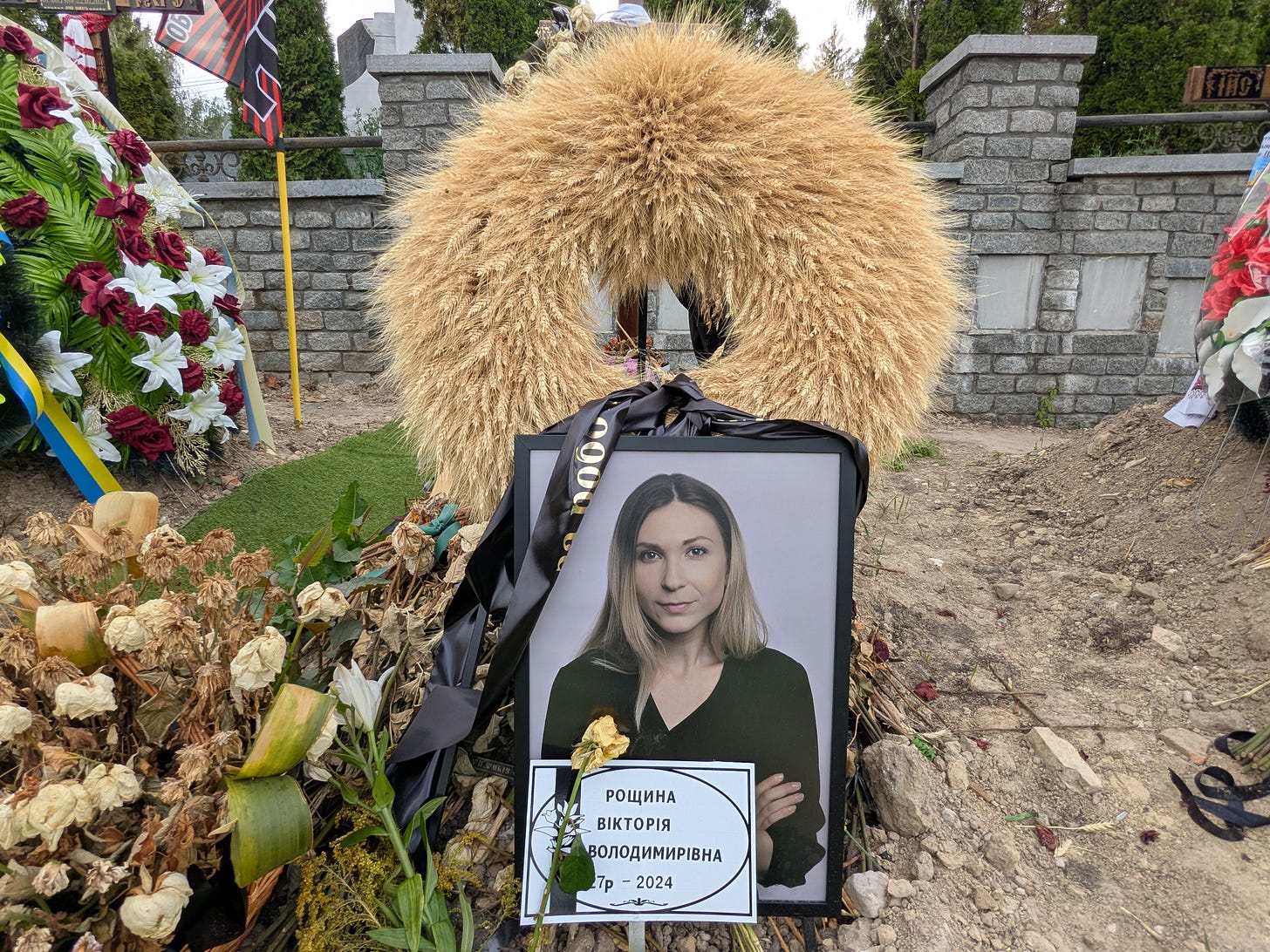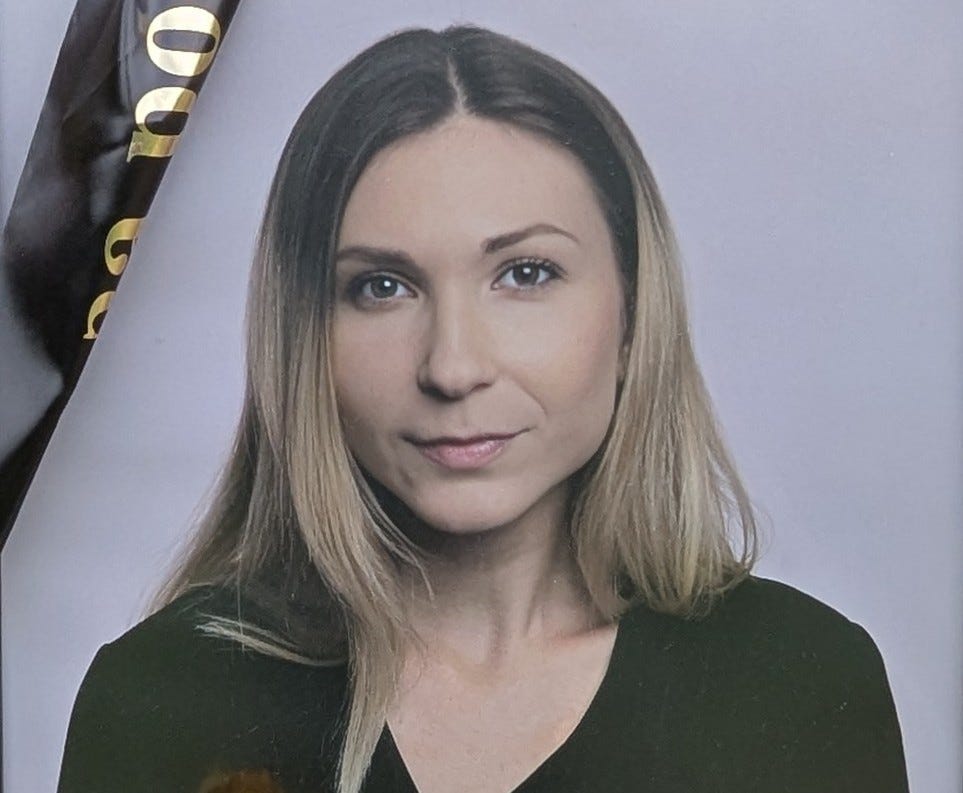Killing the messengers
Putin and other autocrats believe that oppressing journalists will suppress the truth. It is a belief at once malicious and mistaken.
Ukrainian journalist Viktoriia Roshchyna, 27, was laid to rest in August in the Baikove Cemetery in Kyiv. She died last fall after more than a year in Russian captivity. (c. Martin Kuz)
A wreath of wheat hangs over the grave of Viktoriia Roshchyna in a cemetery in the heart of Kyiv. The golden ring hovers like the sun above a framed portrait of the murdered journalist that fronts her unfinished plot. In the photo, she looks serenely strong-willed, a young woman determined to confront war’s perils in pursuit of its horrible truths.
Viktoriia reported from Ukraine’s occupied eastern territories, bearing risk beyond extreme even by the measure of conflict journalism. In March 2022, less than a month into the full-scale invasion, Russian forces detained her in the Zaporizhzhia region in the country’s southeast and held her for 10 days. Her freelance coverage of the war’s initial stages — and her refusal to stop reporting after her release from captivity — earned her the Courage in Journalism Award that year from the International Women’s Media Foundation.
True to her resolute nature, Viktoriia skipped the award ceremony and instead returned to the Russian-controlled regions, where by 2023 no other journalists dared to travel. Her willingness to venture across the front line deterred some editors from accepting her story proposals; they worried for her safety and urged her to pull back. She pushed past their concerns to write about Russian troops abducting tens of thousands of Ukrainian children and the inhumane working conditions inside the Zaporizhzhia nuclear power plant.
But the warnings of her editors proved prophetic in summer 2023. Viktoriia had reentered the occupied zone seeking to expose Moscow’s vast network of detention and torture centers that hold an estimated 15,000 to 20,000 Ukrainian civilians and soldiers. Within days, Russian troops again imprisoned her, and this time she did not emerge alive. Over the next 13 months, she endured torture, starvation and long stretches of solitary confinement, according to the early findings of a Ukrainian investigation into her death.
Russian authorities transferred her from southeastern Ukraine to a prison in Russia in late 2023 and allowed her a single, four-minute phone call during her confinement. Viktoriia spoke with her parents in August last year and told them that she would come home the following month as part of a prisoner exchange. They heard nothing else from her or her captors until receiving a letter two months later from a Russian military official. Without providing details, he informed them that she had died on Sept. 19.
Their daughter finally returned to her native land in February this year as part of an exchange of war casualties between Ukraine and Russia. Covered in cuts and bruises, and mislabeled as an “unidentified male,” Viktoriia’s body was missing the brain, eyes and a segment of the trachea.
Forensic analysis later revealed burn marks consistent with electric shocks and a fractured rib. The hyoid bone in her neck was broken, an injury that can occur during strangulation. The battered, mummified condition of her remains prevented medical investigators from establishing a cause of death. Ukrainian prosecutors have classified her case as a “war crime in connection with intentional murder.”
Viktoriia, 27, represents only the most prominent victim of Russia’s war on journalists. A drone strike earlier this month near the eastern city of Kramatorsk killed a French photographer, Antoni Lallican, and gravely wounded a Ukrainian photographer, Georgiy Ivanchenko, who lost a leg to amputation.
The pair had worn armored vests marked with the word “Press” while embedded with a Ukrainian army unit. Lallican, 37, died in what Reporters Without Borders deemed a “targeted attack,” and the National Union of Journalists of Ukraine identified him as the 19th media worker killed by Russia in the course of covering the war. Ten others have died in artillery and missile strikes on civilian sites, and more than 100 have given their lives fighting for the military.
Autocrats around the world share a desire to silence reporters by killing, jailing, disappearing, deporting or censoring them. Israeli Prime Minister Benjamin Netanyahu has overseen the most appalling and barbaric campaign of that kind in recent history: his military has killed some 250 Palestinian journalists in Gaza since October 2023. The staggering toll — described by the United Nations as “more than in any other conflict in modern times” — offers overwhelming evidence of a state policy to kill the messengers. (The ceasefire between Israel and Hamas appears unlikely to end the violence against them.)
Netanyahu, Russian dictator Vladimir Putin and other authoritarian leaders hold to the belief — at once malicious and mistaken — that their oppression of media workers will suppress the truth about their tyranny. The Committee to Protect Journalists last year found at least 361 reporters worldwide languishing in prison for the “crime” of practicing their profession. Five countries — China, Israel, Myanmar, Belarus and Russia — accounted for over half the total.
Russia continues to detain more than two dozen Ukrainian journalists, including two arrested in Crimea in 2016. (Putin first sent troops into Ukraine in 2014 when he seized the Crimean Peninsula.) Several lived in the news abyss of the occupied territories and, like Viktoriia Roshchyna, they risked imprisonment to cast light on the systematic cruelties of Russian authorities.
Days before Viktoriia’s burial in August in Baikove Cemetery, Ukrainian President Volodymyr Zelensky posthumously awarded her the Order of Freedom and hailed her “unwavering belief that freedom will overcome everything.” Three years ago, when she received the Courage in Journalism Award, she sent a message of acceptance to the ceremony’s organizers in Los Angeles. She deflected attention from herself to praise fallen colleagues and their selfless quest.
“We have remained faithful to our mission, to convey the truth to the world, countering Russian propaganda,” she wrote. “Unfortunately, many journalists have died. I want to dedicate this award to them. After all, they died in the fight for the truth, trying to record Russian crimes. I thank them.”
And we should thank them — and her — for living by the principle that the fight for the truth requires each of us to defy autocrats everywhere and always.
Etc.
— The International Press Institute has named Viktoriia one of the recipients of this year’s World Press Freedom Hero award. The judges wrote that her death in captivity “exposes the brutal crimes that are being perpetrated by Russian forces against the dozens of Ukrainian journalists unjustly held by Russia, and has become a symbol of the risks, and horrors, that journalists face in conflict zones worldwide.”
— The independent Russian news site Meduza — forced out of the country at the start of the war — has published a selection of Antoni Lallican’s images that capture the destruction and chaos of the full-scale invasion in Ukraine. French prosecutors have launched an investigation into the photojournalist’s death.
— My sincere thanks for reading. Please share Reporting on Ukraine with anyone you know with an interest in the country and its people, and if you’re a free subscriber and find the newsletter worth your time, I hope you’ll consider upgrading to paid. My work is entirely self-funded, and it is paid subscribers who make my reporting trips possible. You can also support my work here. Thank you.



